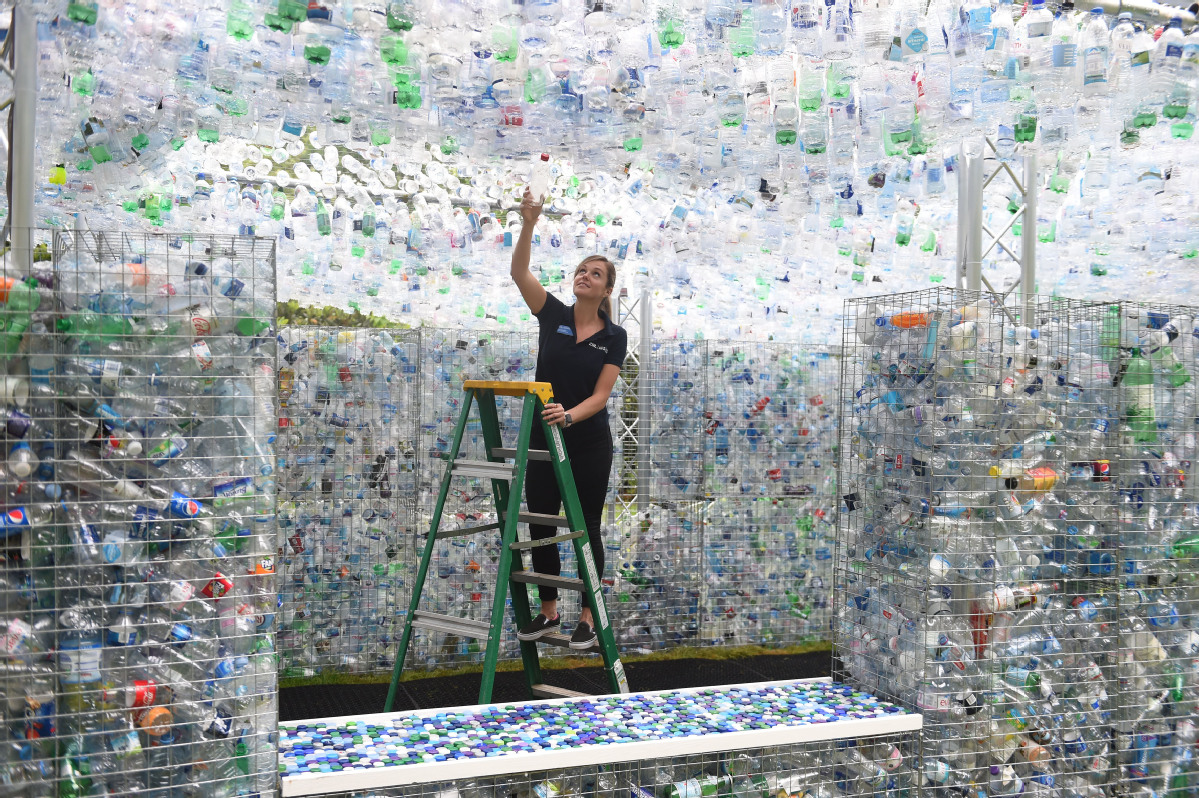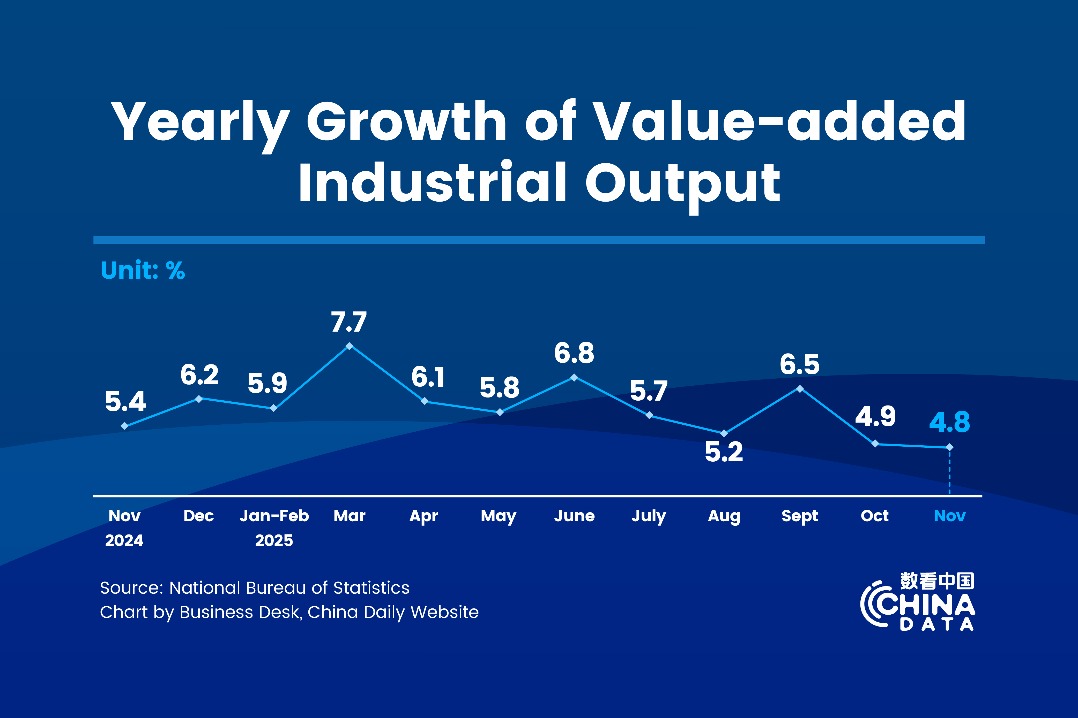Britain getting to grips with its plastic waste


UK government mulls options to reduce mountain of refuse after China introduces ban
British businesses may be charged a fee to cover the cost of recycling plastic packaging they have created in a move aimed at reducing rubbish, a problem that grew when China stopped processing the world's waste at the start of 2018.
Currently, taxpayers in the United Kingdom foot the bill to recycle plastic packaging but the 1 billion pound ($1.27 billion) annual price tag skyrocketed when the option to ship waste to China was taken off the table.
In the aftermath of China's import ban, stockpiles of waste plastic grew and recycling companies started looking at other nations that were willing to take Britain's waste.
But now, under the British government's proposed new program, which is set to come into force in 2023, enterprises creating waste will be legally bound to pay for its disposal or reprocessing. Companies creating waste that is harder to recycle will have to pay higher fees.
When the UK's environment minister, Michael Gove, introduced the idea at a publicity event at a recycling center in London in December, he told journalists Britain wanted to move away from being a "throwaway society", and become one that views waste as a valuable resource.
"We will cut our reliance on single-use plastics, end confusion over household recycling, tackle the problem of packaging by making polluters pay, and end the economic, environmental and moral scandal that is food waste," he said.
The government plans to conduct a year of consultations on the proposals before creating new rules and laws that it hopes will encourage companies to think harder about the packaging they use, and find environmentally friendly alternatives.
The Independent newspaper quoted Friends of the Earth's waste campaigner, Julian Kirby, who welcomed the initiative. He said the government finally "appears to be getting serious about tackling England's vast mountains of waste".
"But while there are many welcome initiatives in this strategy, there is still too much reliance on voluntary measures, and precious little commitment to targets to reduce waste and boost recycling," he added.
Libby Peake, from the Green Alliance, told the BBC: "There's a lot of good in the policy-it's on the right lines. But we need to see the detail of exactly how things will work."
The issue of plastic waste has been the front and center of many people's minds in Britain, thanks to the problem of plastic pollution in the world's oceans being highlighted in the popular BBC documentary series The Blue Planet, and following extensive coverage of China's ban on waste imports. To make the problem even more pressing, government statistics show recycling rates in England have flat-lined in the past five years.
The government's response not only aims to take on companies that produce excessive packaging but also calls for weekly collections from all homes of food waste, clear labeling on products to help people appropriately recycle materials, and the use of electronic tagging to help identify and block illegal shipments of waste overseas. The government also wants to introduce tougher penalties for rogue operators who ship waste to unapproved handlers.
The government intends to introduce returnable deposits on bottles, cans and disposable cups.
But the plans do not go far enough for Labour Party legislator Mary Creagh, who heads the House of Commons' Environmental Audit Committee.
"The government appears to be kicking the waste can down the road yet again," she told the Independent. "The plastic bottle deposit return scheme promised in 2018 won't be ready until 2023. Textile waste piling up in landfills won't be tackled until even later."
Sue Hayman, the Labour Party's environment spokeswoman, called on the government to do more to stop rogue recycling companies passing the problem onto other countries.
"You can't aim to prevent fly tipping without ending cuts to the councils," she told the BBC. "And we need a plan for stopping the export of UK recycling and waste plastics to countries where they currently end up in landfills, or polluting our oceans."
According to National Geographic magazine, China, since 1992, has imported and processed 70 percent of the world's waste. By 2016, half of the world's plastic waste earmarked for recycling was not being processed in the country where it was created, but was being traded internationally.
When China banned the importation of plastic waste into the nation since January 2018, Beijing hoped the move would force the world's recycling industry to take the issue more seriously.
Some nations have responded by either reducing the amount of plastic packaging they produce or by better handling plastic waste internally, but many have simply dumped their problem onto other countries.
Around 45 to 55 percent of the world's discarded plastic had been shipped to China during the 25 years leading up to the import ban. The United Nations said, since it started tracking the flow of waste in 1992, some 106 million metric tons of plastic waste produced by developed countries ended up in China.
Now, some of that waste is being sent to other countries.
Amy Brooks, a doctoral student at the New Materials Institute of the University of Georgia's College of Engineering and the lead author of the Chinese Import Ban and its Impact on the Global Plastic Waste Trade, a study that appeared in the journal Science Advances, told China Daily the displaced waste was creating a huge problem.
"There is lots of uncertainty about what is going to be happening to this displaced waste," she said. "It could be sent to landfills, burned, or buried, or sent to other countries that do not necessarily have the infrastructure to manage it."
Her study found that China imported plastic waste from at least 43 countries in 2016 and that many subsequently sought new countries willing to take their waste instead of dealing with it locally.
Greenpeace Unearthed said more than 80 percent of all trash exported from the United States was being shipped to Asia before China introduced its import ban. Recyclers in Malaysia, Vietnam, Turkey, Indonesia, Thailand and South Korea have subsequently picked up some of the slack.
Analysis of trade data by the Financial Times found that, in the first half of 2018, imports of plastic trash increased by 56 percent in Indonesia, doubled in Vietnam, and rose by 1,370 percent in Thailand.
National Geographic said Malaysia has now become the world's largest processor of plastic waste. It is dealing with 215,000 tons of waste from the United States, 115,000 tons from Japan, 95,000 tons from the UK, and 37,000 tons from Australia.
Environmentalists will be hoping Britain's proposed new waste management strategy will ensure the nation produces less waste in future, and that the waste it does produce is processed within its own borders.



































